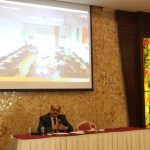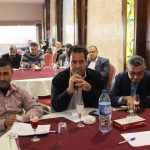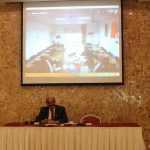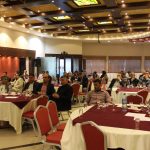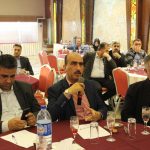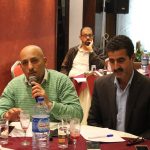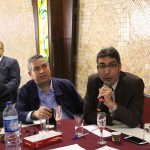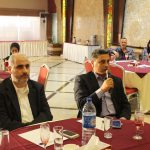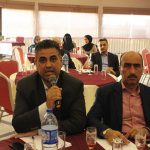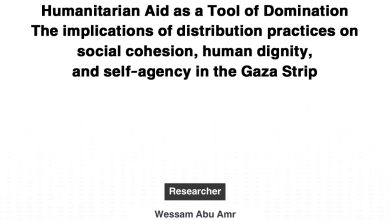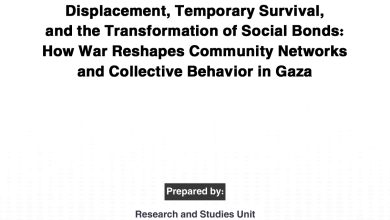Re-launching the UN Campaign: Full Member State, Joining UN Bodies and Reconstructing the International Legal Track (e.g., ICC, ICJ)
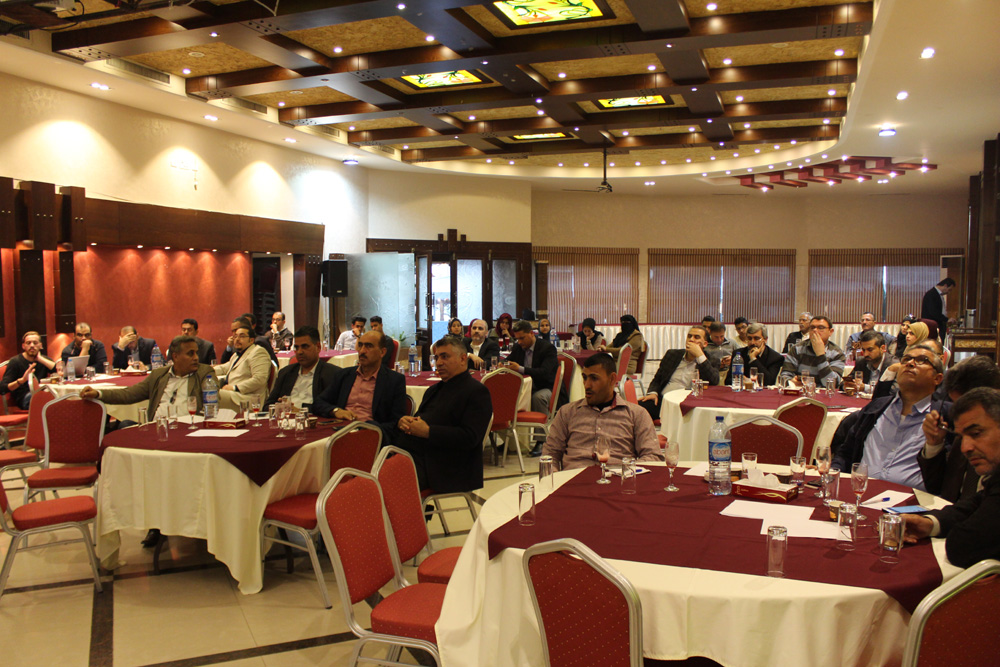
Date: Monday, April 8, 2019, 18:00
Location: Light-House Hotel, Gaza City, Palestine.
Background:
“Building Strategic Capacity: Empowering Civil, Political and Emerging Constituencies in Palestine and Israel” is an EU Peacebuilding Initiative-funded project that develops the ongoing work of the Palestine Strategy Group (PSG), the Palestinian Citizens of Israel Group (PCIG) and the Israeli Strategic Forum (ISF). This roundtable discussion was part of the PSG dimension of the project. Since being founded in 2008, the PSG has produced a considerable number of studies and strategic reports on the Palestinian issue. In cooperation with Pal-Think for Strategic Studies, the Palestinian Center for Israeli Studies (MADAR) and Oxford Research Group, the PSG will produce 12 research papers between 2017 and 2020 which deal with multiple themes and perspectives that then culminates in the publication of the Strategic Policy Manual “Palestine 2020”. This policy report will be presented at a major conference in Ramallah in 2020 and incorporate all the findings of the 12 PSG research papers as well as conclusions of the PCIG.
Workshop’s Attendees:
The roundtable was conducted in the Gaza strip. Attendees included Dr. Nasser Al-Yafawi as a moderator. Mr. Shawan Jabbarin is General Director of Al-Haq, an independent Palestinian non-governmental human rights organization based in Ramallah. And also, a diverse combination of 47 participants including journalists, professors, activists, intellectuals, writers, political analysts, and college students. Besides, 16 of the attendees were less than 30 years old, and 31 of them were above 30 years old. Only 10 female participants attended whilst 37 were male.
Moderator Contribution:
Dr. Al-Yafawi noted that this roundtable is part of Pal-Think’s continued project with ORG and the PSG within the EU Peacebuilding initiative “Building Strategic Capacity: Empowering Civil, Political and Emerging Constituencies in Palestine and Israel.” Last year, the project tackled issues related to Palestine internally and on the Israeli agenda and then covered Palestine in the region, and now presenting policy papers related to Palestine on the international agenda. Ultimately, all the policy papers written will be presented at the conference in 2020. The policy paper of this session is Re-launching the UN Campaign: Full Member State, Joining UN Bodies and Reconstructing the International Legal Track (e.g., ICC, ICJ), written by Mr. Shawan Jabbarin.
Mr. Shawan Jabbarin Contribution:
Mr. Jabbarin refereed to the PLO attempts since its inception to defend the Palestinian rights in general and join international bodies, for the sake of fighting for Palestinians’ rights in the international arena. In his paper, Mr. Jabbarin presented a Palestinian approach, that shifts from being a political approach to one that is based on international law. Besides, trying to understand the conditions that Palestinians have to meet to become a full member state, and the role of international organizations in supporting Palestine to become a full member state in the UN. Especially the International Court of Justice (ICJ) and the International Criminal Court (ICC).
Mr. Jabbarin also touched upon other international entities, such as World Health Organization and UNESCO, these are of great help for Palestinians to promote their right to self-determination, establishing Palestine’s sovereignty over its land, and facilitate the process of Palestine joining to other international organizations. Furthermore, membership in these international bodies assists in exposing the Israeli violations against Palestine’s sovereignty at all levels. In addition, the policy paper discusses these issues from a political perspective and provides a methodology for Palestine to be able to join international organizations and analyze the challenges that Palestinians need to overcome to do so.
The paper also dealt with the internal Palestinian affairs including the national political divide and its impact on Palestine’s membership in the United Nations and its international obligations. Also, how the Palestinian leadership should act as a state rather than a political party. Mr. Jabbarin also noted that the paper is still under development and that the audience feedback is an essential factor in enriching the paper. He stressed that joining the United Nations should be put into action not words and that this is a working policy paper and different from papers that are subjected to the abstract academic standard, which is not subjective and not acceptable in this case.
Attendees’ Comments:
- Dr. Wajih Abu Zarifa— I think it is important to talk about the United Nations and the Palestinian issue, especially with the legitimacy being violated today by conspiracies to circumvent the Palestinians’ right. Above all, the deal of the century which is concerned with finding a regional solution to the conflict. I think the focus on the United Nations is important to fight back against any conspiracies and commitment to the two-state solution and adherence to the right of self-determination on the Palestinian land. It is worth mentioning that Palestinian unity is also targeted and that efforts to create Palestinian cohesion and unity on Palestine’s soil can be advocated for through the PLO in the United Nations. It is essential to have a clear Palestinian vision in place, not only official, but also popular and institutional, and to have integration to consolidate the Palestinian presence in the United Nations and all bodies connected with it. In fact, uniting the Palestinian position regarding the Palestinian relationship with the United Nations, to avoid contradictions towards these institutions and this is required in addition to the development of a Palestinian strategy to deal with other issues involved, the paper is crucial, and I hope to be a reference and enlightenment to Palestinian decision-makers.
- Mohammad Hijazzi—I think that it is vital to develop the capacity of Palestinian entities representing the Palestinians in the international setting. It is good that the PNA joined international bodies, but still, there is not a unified national vision that promotes the rights of the Palestinian people and contrast Israel. Israel must be accounted for its violations especially for its war crimes where evidence is ready to account Israel in the International Criminal Court and the International Court of Justice. Therefore, Palestinian institutions should have strategy and action plans for their work with international entities. I think civil society organizations have an essential role in building the capacities of governmental bodies to play a pivotal role in the Palestinian cause.
- Marwan Hammad—Ministry of Foreign Affairs: It is important to, first of all, take legal measures against the Israeli occupation, such as the issuing documents exposing the crimes of the Israeli occupation during the great marches of return. I believe that the legal statements issued by all the local and international legal institutions are great evidence to expose Israeli occupation crimes. Also, it is necessary to activate legal procedures in the U.S to stop the unjust and unfair acts which are even contradict with international law. In the U.S, such as the arrest of lawyers who objected Trump’s decision moving the US Embassy to Jerusalem.
- Dr. Hossam Al-Dajani— Writer and Political analyst: I hope that the policy paper addresses the pros and cons of joining international entities in the status quo of the Palestinian cause and its current parameters because we have two projects a political project led by the PNA and a resistance project led by movements in Gaza. It will be useful if the paper analyses which international organizations help guide the two Palestinian projects and prevent the exclusion of any party or movement in global settings.
- Tayseer Muheisen— Ministry of Foreign Affairs: two things are critical regarding the issue of joining the UN institutions. First, it has to do with the mechanism to join the United Nations and its institutions. It is noted that the PA think twice when it comes to joining international entities, as there are political calculations that may delay that process. The PA had intentions to join the ICC for years but did not do that for political obstacles; in fact, this should not be the case. Second, it has to do with having strategies and action plans to get the advantage of these organizations, also to work hand-in-hand with other countries that support the Palestinian cause, to fight back against Israel and its alliances in those international settings.
- Yahya Qaoud— Researcher: I hope that the paper will analyze the difference between policies and laws in the UN institutions. In fact, laws are always rigid, but the West generally and morally supports the Palestinian cause. Nevertheless, legal-wise Israel is not held accountable for its barbaric acts and war crimes. Actually, the process of holding Israel accountable in the ICC is slow. Therefore, it is more than necessary to suggest mechanisms and approaches account Israel for its crimes.
- Dr. Fuad Ahmed— a university professor: I think we need to understand the difference between Security Council and the United Nations, the UN is more like a parliament, but when it comes to political decisions, they are implemented by the UN Security Council. So, the UN has more of a relief role while the security council is Political executive actor.
- Dr. Gamal Al-Baba— the Palestinian Planning Centre: the legal aspect of the Palestinian issue is crucial. In other words, we agree that the negotiations project and the political solution project are dying and the resistance project is also on the same page. Therefore, we have to look for new tools to activate the Palestinian cause and regain attention to it in the international debate. I think when it comes to the legal side, Israel is the weakest, targeting Israel from a legal point of view in the international arena is an effective strategy to go with to put the Palestinian issue back on the right track, but this calls for a clear and integrated plan by the Palestinian Authority to fight Israel on the international stage.

